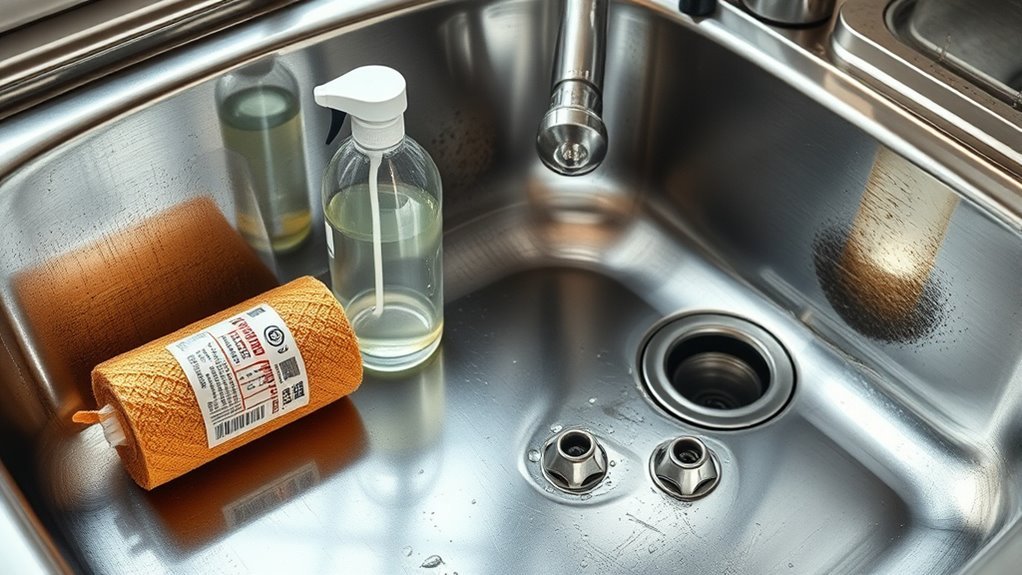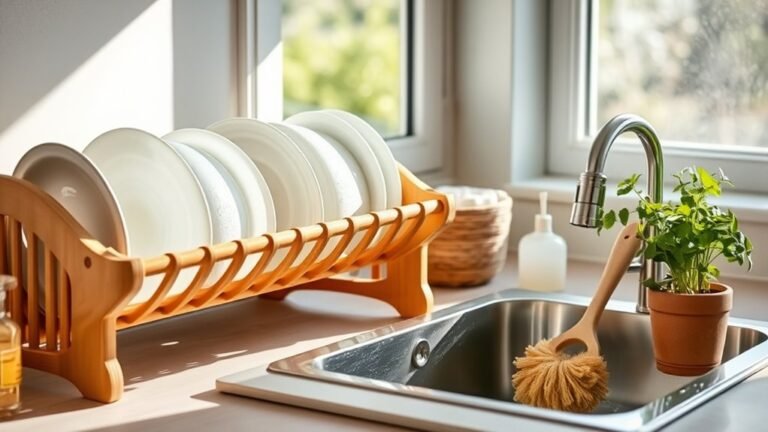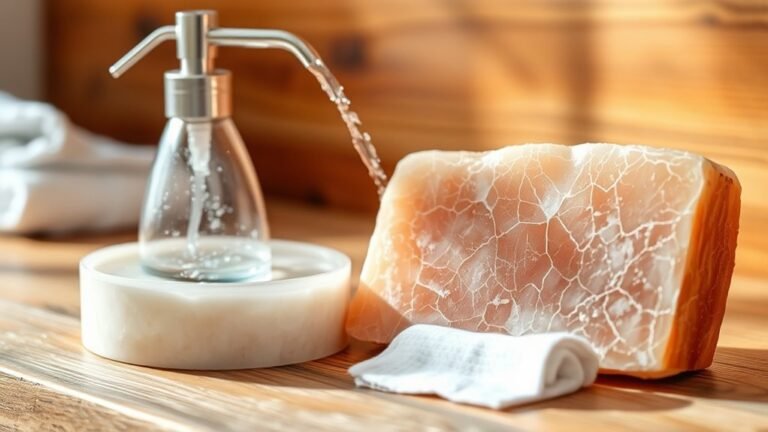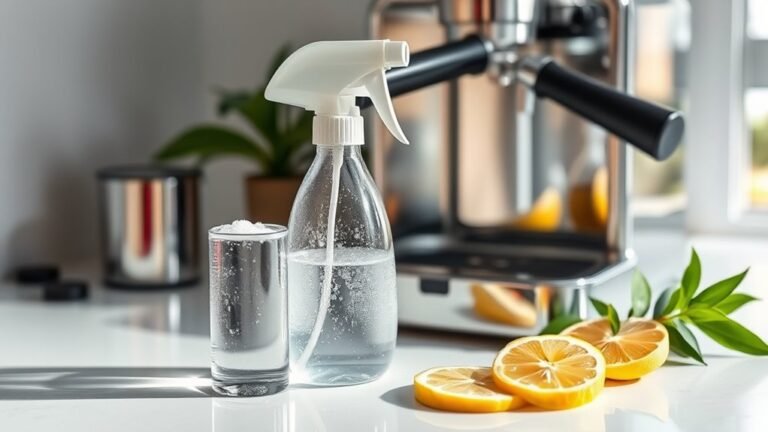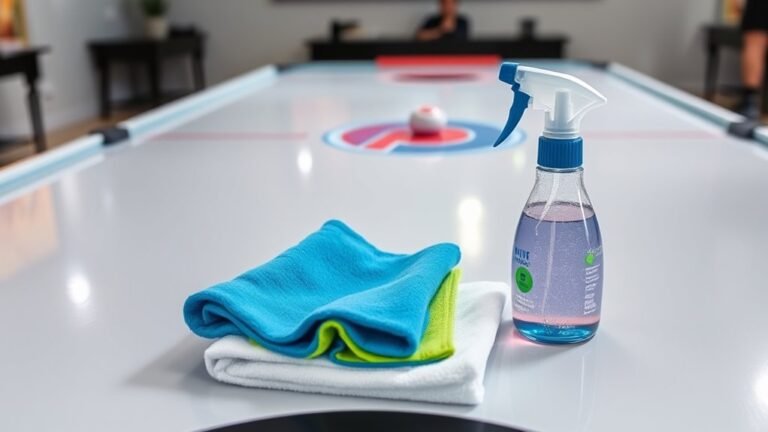Cleaning Mistakes That Damage Your Sink
You’re damaging your sink when you use abrasive cleaners or steel wool, which scratch protective surfaces. Harsh chemicals like bleach or ammonia corrode stainless steel and stone, weakening your sink. Neglecting regular cleaning leads to buildup and clogs, while leaving standing water or food debris encourages corrosion and bacteria growth. Always rinse and dry thoroughly to prevent residue damage. Avoiding these common mistakes preserves your sink’s longevity and appearance, and understanding proper care techniques can help you maintain it effectively.
Using Abrasive Cleaners and Tools
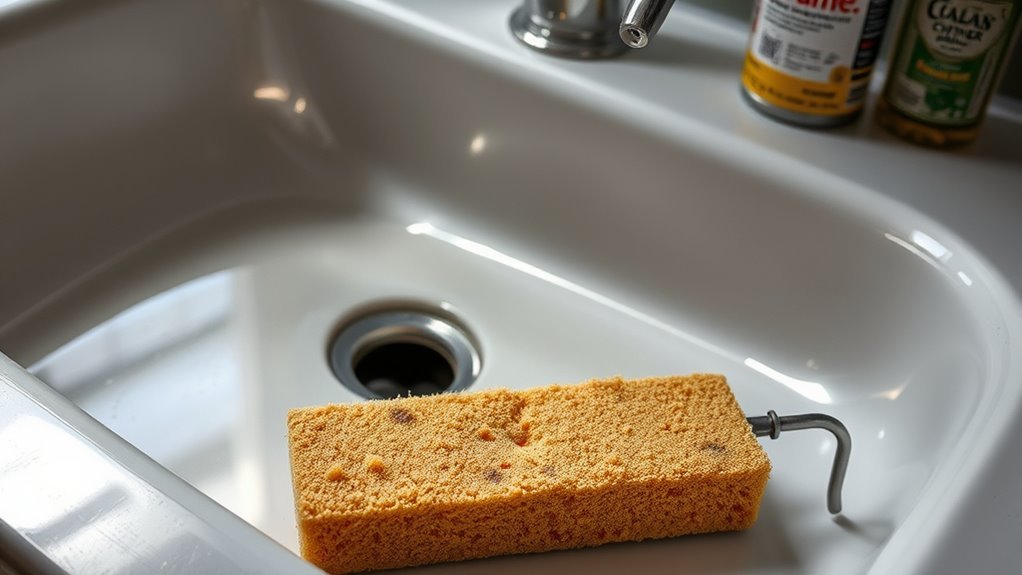
Although abrasive cleaners and tools might seem effective for scrubbing tough stains, they can actually scratch and wear down your sink’s surface over time. You want to avoid abrasive materials that degrade finishes, leading to dullness and potential corrosion. Instead, opt for cleaning alternatives like mild detergents, baking soda, or non-abrasive sponges. These options maintain the sink’s integrity while still removing grime efficiently. When selecting cleaning products, check labels to verify they’re safe for your sink’s material—whether stainless steel, porcelain, or composite. Using abrasive tools might offer temporary results, but they limit your sink’s lifespan and appearance. By choosing gentler methods, you preserve your sink’s freedom from damage and the need for costly repairs or replacements.
Ignoring Regular Cleaning and Maintenance
Neglecting regular cleaning and maintenance can lead to buildup that damages your sink’s surface and drainage system. To avoid costly repairs or replacements, stick to a frequency schedule and use a maintenance checklist that fits your lifestyle. Consistency is key to preserving the sink’s finish and ensuring smooth drainage.
| Task | Recommended Frequency |
|---|---|
| Wipe down surfaces | Daily |
| Clear drain traps | Weekly |
| Deep clean basin | Bi-weekly |
| Inspect for leaks | Monthly |
| Check for clogs | Quarterly |
Using Harsh Chemicals That Corrode Sink Surfaces
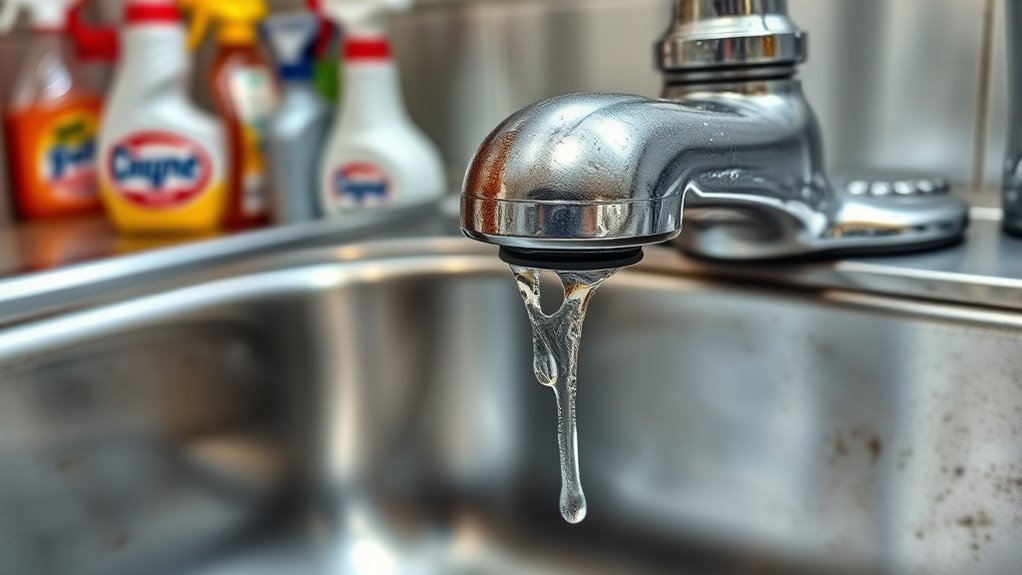
When you use harsh chemicals to clean your sink, you risk corroding its surface and weakening the material over time. Corrosive agents found in strong cleaners trigger chemical reactions that degrade protective coatings and metal layers. This damage compromises your sink’s durability, leading to pitting, discoloration, or even structural failure. To maintain your sink’s integrity, avoid products containing bleach, ammonia, or acidic substances like hydrochloric acid. Instead, opt for milder, pH-neutral cleaners designed for your sink’s specific material. Always rinse thoroughly after cleaning to remove residual chemicals that continue corrosive effects. By steering clear of harsh chemicals, you preserve your sink’s finish and extend its lifespan, giving you the freedom to clean effectively without sacrificing quality.
Scrubbing With Steel Wool or Metal Pads
You shouldn’t use steel wool or metal pads to scrub your sink because they can cause fine surface scratches that damage the protective coating. Once the coating is compromised, your sink becomes vulnerable to rust and corrosion. Using abrasive tools risks long-term deterioration and reduces the sink’s lifespan.
Surface Scratches Risk
Although scrubbing with steel wool or metal pads might seem effective for removing tough stains, it can easily cause surface scratches on your sink. These abrasions compromise your sink’s finish, making it vulnerable to dirt buildup and corrosion. To maintain your sink’s integrity, explore surface treatment options that enhance durability and resist wear. Instead of harsh scrubbing tools, opt for non-abrasive pads or soft cloths combined with appropriate cleaning agents. Regular maintenance techniques, like gentle wiping and using mild detergents, extend your sink’s lifespan without risking damage. Avoid shortcuts that sacrifice your sink’s surface quality—choosing proper cleaning methods preserves both appearance and function, giving you the freedom to enjoy a pristine, long-lasting fixture.
Protective Coating Damage
Surface scratches aren’t the only concern when scrubbing your sink with steel wool or metal pads; these tools can also strip away the protective coatings designed to shield your fixture from corrosion and stains. When the protective coating is compromised, your sink becomes vulnerable to damage that’s harder to reverse. To maintain your sink’s integrity, avoid abrasive scrubbing tools that wear down this essential layer. Instead, opt for softer sponges or non-abrasive pads recommended in maintenance tips. Regular gentle cleaning preserves the coating, extending your sink’s lifespan and keeping it looking new. Protecting this barrier means you won’t have to deal with costly repairs or replacements caused by avoidable damage. Prioritize proper cleaning techniques to safeguard the protective coating and maintain freedom from frequent upkeep hassles.
Rust and Corrosion
How does scrubbing with steel wool or metal pads lead to rust and corrosion in your sink? These abrasive tools scratch the sink’s surface, removing protective coatings and exposing the underlying metal. This exposure accelerates oxidation, leading to rust and corrosion. To maintain your sink’s integrity, avoid harsh scrubbing methods and focus on rust prevention and corrosion treatment.
Consider these points:
- Steel wool fragments can embed, causing micro-scratches
- Scratches break down the sink’s protective layer
- Moisture trapped in scratches speeds oxidation
- Corrosion weakens structural integrity over time
- Rust stains are difficult to reverse without treatment
Opt for non-abrasive cleaners and soft cloths to preserve your sink’s finish and freedom from damage.
Leaving Standing Water or Food Debris in the Sink
If you leave standing water or food debris in your sink, it can cause clogs and promote bacterial growth. These issues not only damage your sink’s surface but also affect your plumbing over time. To prevent this, make sure to rinse and clear your sink promptly after use.
Causes of Standing Water
When you leave standing water or food debris in your sink, you’re creating ideal conditions for clogs and unpleasant odors. Water pooling occurs when drainage is slow or blocked, leading to standing water that can damage your sink’s surface and plumbing. Understanding the causes helps you avoid these issues and maintain freedom from costly repairs.
Common causes of standing water include:
- Partial drain blockages from grease buildup
- Misaligned or damaged sink drain parts
- Inadequate slope in sink design causing poor drainage
- Accumulation of food particles restricting water flow
- Faulty or clogged garbage disposal units
Address these to prevent water pooling and keep your sink functioning smoothly without damage or inconvenience.
Effects of Food Debris
Standing water often carries food debris that can accelerate sink damage beyond just slow drainage. When food particles remain trapped, they undergo food decomposition, releasing acids that corrode sink surfaces and plumbing components. This degradation weakens materials, leading to cracks or leaks over time. Additionally, the presence of stagnant water and decomposing food creates an ideal environment for bacteria growth. These microorganisms not only cause foul odors but can also form biofilms that clog pipes and promote corrosion. By allowing food debris to linger, you increase the risk of structural damage and costly repairs. Understanding these effects empowers you to maintain your sink’s integrity and avoid issues that restrict your freedom from frequent plumbing problems. Addressing food debris promptly is essential for preserving your sink’s functionality and lifespan.
Prevention Tips for Sinks
Because prolonged exposure to water and food debris accelerates sink damage, you should develop habits that minimize their presence. Effective sink care relies on a consistent maintenance routine that prevents buildup and corrosion. Avoid leaving standing water or scraps in your sink to preserve its surface and plumbing.
Incorporate these prevention tips into your routine:
- Rinse the sink thoroughly after each use to remove residues.
- Use a drain strainer to catch food particles.
- Wipe the sink dry with a soft cloth to prevent water spots.
- Dispose of food waste properly instead of rinsing it down the drain.
- Schedule regular deep cleanings with appropriate, non-abrasive cleaners.
Neglecting to Rinse and Dry After Cleaning
Three simple steps often overlooked after cleaning your sink can lead to long-term damage: thorough rinsing, drying, and wiping. Skipping proper rinse techniques leaves cleaning residues that corrode surfaces or cause stains. You should use warm water and a focused spray to flush away all detergent and debris, ensuring no buildup remains in corners or seams. After rinsing, apply effective drying methods like using a microfiber cloth to absorb moisture fully. Air drying alone can cause water spots and mineral deposits, especially on stainless steel or stone sinks. Wiping down the sink also prevents bacteria growth and maintains surface integrity. By mastering these steps, you’ll preserve your sink’s finish and functionality, gaining freedom from frequent repairs or replacements.
Using Bleach on Stainless Steel or Stone Sinks
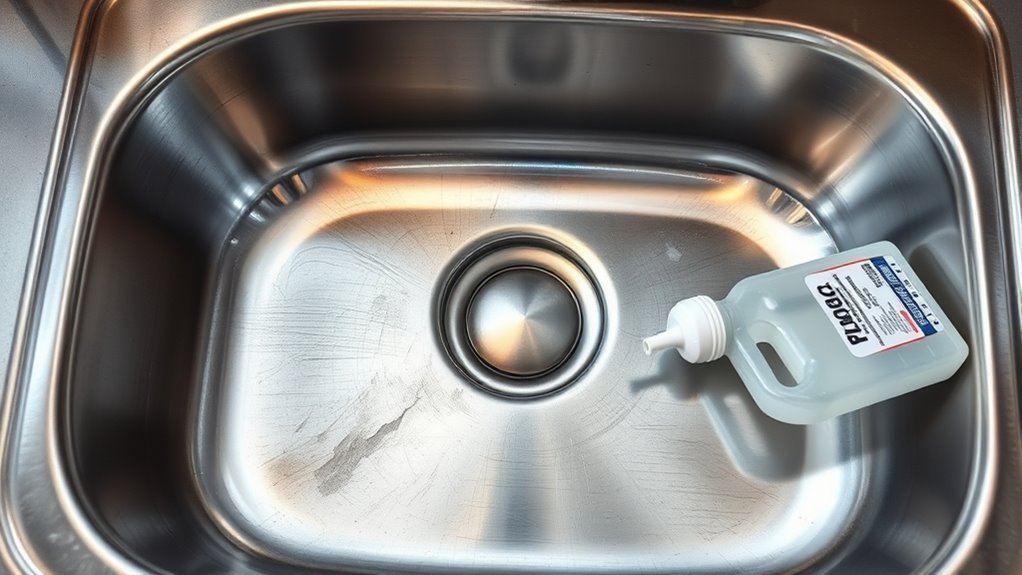
Proper rinsing and drying help protect your sink’s surface, but using the wrong cleaning agents can cause more severe damage. Bleach, while effective as a disinfectant, is harsh on stainless steel and stone sinks. It can cause corrosion, discoloration, and surface degradation, reducing your sink’s lifespan. Instead, opt for bleach alternatives that maintain hygiene without harming materials. For effective stainless steel care, use mild detergents or specially formulated cleaners.
Avoid these common pitfalls when cleaning your sink:
- Using bleach or ammonia-based products
- Leaving bleach residue on the surface
- Abrasive scrubbing post-bleach exposure
- Ignoring manufacturer’s cleaning guidelines
- Failing to rinse thoroughly after cleaning
Choose safer products to keep your sink durable and pristine.
Frequently Asked Questions
How Often Should I Deep Clean My Sink for Best Results?
Think of your sink as a loyal guardian that needs regular care to stay strong. For ideal sink maintenance frequency, deep clean it every one to two weeks. Establishing a deep cleaning schedule prevents buildup and keeps your sink fresh and damage-free. This routine guarantees freedom from stubborn stains and clogs, letting you focus on what matters. Stick to this practical timeline to maintain peak performance and longevity.
What Natural Cleaning Alternatives Are Safe for All Sink Types?
You can safely clean all sink types using natural alternatives like baking soda and a vinegar solution. Sprinkle baking soda to gently scrub away grime without scratching surfaces. Follow with a vinegar solution—mix equal parts water and white vinegar—to disinfect and break down mineral deposits. This combo is effective, eco-friendly, and won’t damage your sink’s finish, giving you freedom from harsh chemicals while keeping your sink spotless and well-maintained.
Can Dish Soap Alone Effectively Clean and Disinfect Sinks?
Dish soap effectiveness is solid for removing grease and everyday grime from your sink, promoting basic sink hygiene. However, it doesn’t disinfect thoroughly, so relying on dish soap alone won’t eliminate all bacteria or viruses. For complete sink hygiene, you’ll want to supplement dish soap with a disinfectant, especially in high-use areas. This approach keeps your sink clean and safer without overcomplicating your routine or limiting your cleaning freedom.
How Do I Remove Hard Water Stains Without Damaging the Sink?
To remove hard water stains without damaging your sink, use gentle hard water solutions like diluted white vinegar or a baking soda paste. Apply, let sit briefly, then scrub softly with a non-abrasive cloth. Rinse thoroughly to prevent residue build-up. For stain prevention, dry your sink after each use and apply a protective coating periodically. This approach keeps your sink spotless while maintaining its surface integrity, giving you freedom from harsh chemicals and damage.
Are There Specific Cleaning Products Recommended for Granite Sinks?
Imagine Sarah, who switched to granite sinks at home and wanted proper granite care. You’ll want to use pH-balanced cleaners specifically designed for granite, like a mild dish soap or a granite cleaner such as Granite Gold. These products support sink maintenance by preventing etching and staining. Avoid harsh chemicals or abrasives, as they can dull the surface. Regular gentle cleaning keeps your granite sink looking fresh without sacrificing its durability or freedom from damage.
